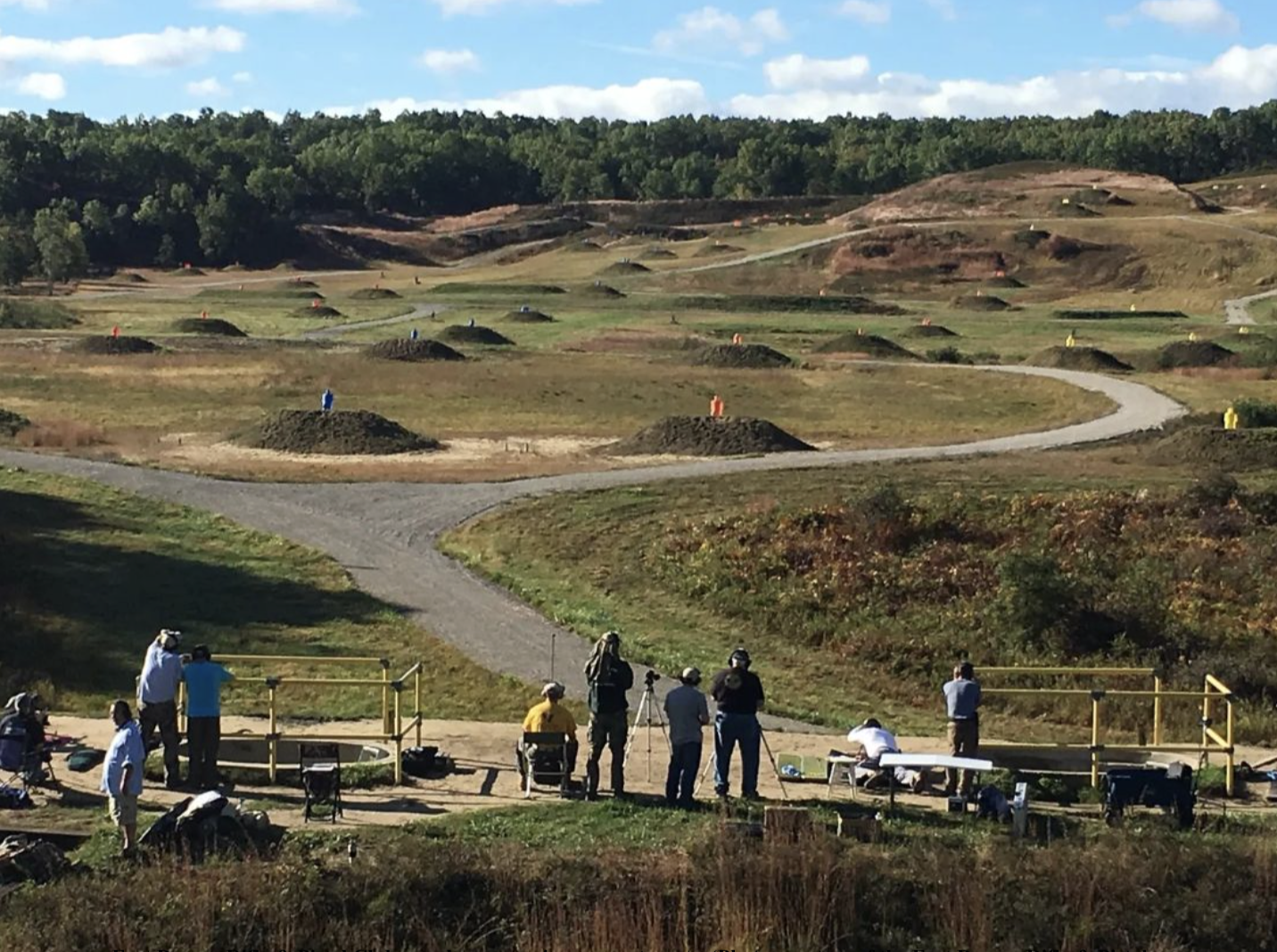Hunting with AR-style rifles, also known by some as Modern Sporting Rifles (MSRs) and others simply as ARs, has seen a remarkable increase in use in the field by sportsmen over the past decade. This is according to recent research from the Outdoor Stewards of Conservation Foundation (OSCF). A survey conducted by Responsive Management for OSCF found 41 percent of hunters now use AR-style rifles for hunting, up from 25 percent in 2014.
This rise is attributed to the firearms’ modularity, versatility and increased accessibility.
“The growing use of ARs for hunting is on the rise, which does not surprise me,” said OSCF executive director Jim Curcuruto. “The survey showed that over half of hunters who do not currently use ARs have expressed interest in using them in the future.”
The survey, which included responses from more than 500 hunters across various demographics, examined preferences in hunting firearms and reasons for using ARs. Nearly a quarter of AR hunters surveyed have been using the firearm for six to 10 years, and around 57 percent adopted the platform in the past five years. Maybe surprisingly, large game, including deer and elk, is the most common target for AR hunters, with 80 percent of respondents citing it as their main quarry. That is up from 57 percent in 2014 and is likely due to two factors: 1) more people have become familiar with the benefits of using an AR-platform rifle and 2) the platform offers many more chamberings in calibers better suited for larger game. Big game, primarily deer, is also the most hunted game in North America. Small game, such as rabbits and squirrels, remained stable in preference.
The survey didn’t specify predator hunters, but it is likely their numbers, interest in and use of the AR platform has remained fairly consistent as well. Predator hunters were among the first group of hunters to really latch on to and make widespread use of ARs, particularly the AR-15 whose original chambering in .223 Rem. remains ideal for smaller critters such as coyotes, foxes, bobcats and ground hogs.
Interest in ARs today isn’t limited to just current users. Over half of the hunters who haven’t used AR-platform rifles for hunting expressed a likelihood of trying them if it became legal in their state.
“I was surprised to see that more than 50 percent of hunters that are not currently using AR-platform rifles to hunt with responded that they are likely to try hunting with these versatile rifles in the future,” Curcuruto said. Nearly half of those surveyed still prefer traditional hunting rifles such as bolt actions, but for many, their minds are open to expanding their collection to include an AR.
The research underscores a shift in hunting preferences, with more hunters appreciating the ease of shooting, accuracy and reliability of AR-platform rifles. As the popularity of ARs continues to grow, industry experts anticipate further integration of these firearms into mainstream hunting practices, proving these are not “weapons of war” nor “assault weapons” as some have vilified them, but a very practical and natural evolution in firearms choice and development for those who practice their Second Amendment rights in a variety of legal and traditional pursuits.









I’ve been using one in .450 Bushmaster ever since my state allowed straight walled rifle cartridges.
I just put together a .450 Bushmaster AR pistol. It cycles fine with subsonic ammunition and I intend to buy a suppressor for it – why? Because I can – that’s why. The AR platform is so flexible it even accommodates ridiculous configurations like my aforementioned pistol. The AR platform seemingly can do it all.
Maybe FUDDs are changing their opinion on the pejorative “Assault Rifle”.
They are dying of old age. The M1/M14 generation (Baby boomers) now is all past 65.
I’m a boomer and hunt with an AR
Smaller crtters with an AR 15 and larger game with an AR 10.
Of course I also use other rifles as well.
Amen!
I generally prefer to hunt larger game with bolt action rifles chambered in classic calibers such as .270, 30-06, and .338 Winchester Magnum. This is largely a result of hunting in the Snake River and Imnaha canyons where 300+ yard shots are normal.
As a general rule, bolt action rifles tend to be more accurate than semiautomatic rifles. Interestingly; most of these politically correct rifles are merely adaptations of the ’98 Mauser action. They are technically Military Sporting Rifles, perhaps with decorative wood stocks.
However; I’ve never been averse to using AR-15 style rifles for varmints including two legged varmints. I would also utilize a H&K-91 chambered in 7.62 mm for hunting deer, bear and cougar in heavily forested areas where closer range shooting is normal. I’ve also offended my hunting partners by utilizing a bolt action rifle chambered in .50 BMG to shoot an elk at 950 meters.
The modern, military style, semiautomatic rifles are being embraced by hunters because their designs have evolved. They tend to be more accurate than vintage rifles and most now have provisions for optical sights. They are functionally no different than the classic Browning Automatic that looks so much like a bolt action rifle.
I would concede that many people in the hunting or target shooting communities were far to eager to sacrifice modern, military style, semiautomatic rifles to the gun prohibitionists in the hopes that their preferred firearms would be spared. They were idiots. I have equal contempt for the TactiCoolFools and ignorant judges who give my marijuana bootlegging tenant a free pass for shooting at my son because he utilized a politically correct, pump action, 12 gauge shotgun. His scum sucking whore of an attorney even argued that he wasn’t a threat because he only loads his shotgun with “harmless buckshot” (quoted from court documents) when he shoots at my family.
This is a surprise? My understanding of the rise of the bolt action rifle in American hunting fields was precipitated by the Doughboys experience with the 1903 and 1917 in WW I. I’ve never taken a game animal with an AR, but I did once take a whitetail with a Galil AR in .223 with a 55 gr soft point to the neck. Dropped like a sack of hammers. It was a shot of opportunity and it was the only rifle I had at hand.
Very true, prior to the Great War most big game hunters in the U.S. used lever action rifles like the Winchester models 1892, 1894, 1886, 1895 or Savage 99. After the war in the 1920’s Remington introduced the Model 30 Express (a M1917 type) Winchester introduced the Model 54 and even Springfield Armory arsenal introduced the NRA Sporter. Don’t forget about the Savage Super Sporter bolt action as well. Bolt actions could fire much more powerful high velocity smokeless cartridges, they were cheaper to manufacture with less moving parts and had greater range and accuracy than your average lever action.
Yep.
“Savage 99”
Cream of the lever crop, especially in 308. Although if the short-throw Win 88 had come out earlier, it might not be so obscure.
JMO.
XZX, my Uncle Steve, Ft. Collins, CO, back in the day used a Savage 99 in 308 to take elk, mule deer and black bear. I remember seeing his trophies as a boy. I would pick his brain. He said most of his friends hunted with a 30-06 bolt action of some discription. He said he never felt underguned. He did say he always shot 180 gr bullets.
The 99 is one of the great designs – the man Savage also invented the radial tire and a torpedo which actually worked (per wikipedia). We could have used it in early ww2. Seems like he had a talent for taking an idea to a finished product, no need for gen 2, 3, 4, …
My 13 year old son and I each took a buck with my AR in 308 last week.
We can both use the rifle because it is ambidextrous, the adjustable-length stock fits us both, and the recoil is softened because it’s a semi-auto
AR “style” rifles are the more convenient, accurate and versatile semi-automatic rifle for hunting than any other repeating firearm.
AR rifles are more American than any German style bolt rifle.
Wow, Rick. You really did drink the Kool Aid, didn’t you? I’ve got several turn bolts that weigh less my ARs. That Delta Elite I used to own was a beast. It weighed more than my M1A and HK-91.
He said nothing about weight of anything.
Gadsden, at first I thought you must have been carrying your 10mm Delta stoked with 900gr. handloads, as I went and weighed my Delta Gold Cup at 38.2 oz. and had to guess at where the extra weight came from . Then I remembered we’re discussing AR platforms and I see that Colt made a “Delta HBAR” in the 80s that was probably a tank – it even shipped with an armored 3-9×40 Tasco (!)
scope in a carry handle mount and a cheek piece riser. Kudos if you still have that old clunker – they’re worth a fortune to the right collector.
The Springfield M1903 was a semi-copy of the Mauser.
Despite Springfield Armory’s use of a two-piece firing pin and other slight design alterations, the M1903 was, in fact, a Mauser design, and after that company brought suit, the U.S. government was judged to pay $250,000 in royalties to Mauser Werke.
I’m an old man now. I’ve taken game and varmints/nuance animals with nearly every type of firearm available.
At this point in my life, I’d as soon carry a lightweight AR than a heavy fence post of a bolt rifle. Or else a lever action carbine.
Look at the history of what was military issue then what became popular as hunting/sporting weapons.
Per caliber, bolt guns average lighter than ARs. Just saying.
If you’re pointing out that your lightweight bolt gun has worse recoil just say so.
neiowa, if you’re recoil sensitive just say so. My safes have calibers from .22 LR to 375 H&H. Never really thought about recoil. It’s just part of shooting.
Yahtzee.
Dem’s Gun Publicity Stunt Just Got Worse.
h ttps://www.youtube.com/watch?v=UZW8DoSIp3w
GREAT WIN: MUSK OUTSMARTS PHILLY JUDGE & DA IN 2A PETITION FIGHT.
By a wise legal move, Musk and his attorneys outsmarted the Democratic DA who tried to shut down his pro-2A petition. Mark Smith Four Boxes Diner explains.
h ttps://www.youtube.com/watch?v=2Q35IzRWp5o
Homeland Security staffers raised ‘serious concerns’ about Tim Walz’s China ties, whistleblower says — and now the House is investigating.
h ttps://nypost.com/2024/09/30/us-news/house-oversight-panel-issues-subpoena-after-whistleblower-said-dhs-employees-discussed-serious-concerns-about-tim-walzs-china-ties-in-internal-group-chat/
Tim Walz’s ‘cozy’ relationship with Communist China probed: ‘Americans should be deeply concerned’.
“The House Committee on Oversight and Accountability are investigating Walz’s connection with government officials in the Asian adversary nation over nearly four decades. ”
h ttps://nypost.com/2024/08/16/us-news/tim-walzs-cozy-relationship-with-communist-china-probed/
Walz Praised Chinese Communism as a System Where ‘Everyone Shares’.
h ttps://freebeacon.com/elections/walz-praised-chinese-communism-as-a-system-where-everyone-shares/
note: a recent Tampon ‘stolen valor’ Tim Walz sentiment — “one person’s socialism is another person’s neighborliness. —– Tampon ‘stolen valor’ Tim Walz 2024.”
h ttps://freebeacon.com/elections/walz-praised-chinese-communism-as-a-system-where-everyone-shares/
TW did put C-19 patients into retirement homes Cuomo NY style, along with Ca, MA, NJ etc.. CCP euthanasia at it’s most efficient.
According to the view’s joyless behar the AR demolishes deer…and with no real pushback from those who should be pushing back in mass the view audience swallows the lie and the next thing you know they are voting for a deranged cackling hyena…connect the h…
h ttps://youtube.com/watch?v=BA-aNrWGeoo&feature=shared
Nothing says cheap like an AR. Does not compare to a finely crafted bolt rifle or single shot with a handsome wood stock. That is something you pass down. The AR you toss into the back of the pickup and forget it.
I wouldn’t toss an AR in the back of a truck, you’ll break all the fancy’s off.
Trolling or not the only times anything came off an M4 that didn’t involve a lot of HME that I ever saw involved a theft of government property investigation.
Your not throwing it hard enough.
I’ve used a 6.8spc AR (suppressed) as my primary deer rifle for the last 8yrs or so. Taken 9-10 deer and a couple of coyotes. It’s a laser and more than does it’s part. Just got a 6.5G upper on clearence from PSA gonna try next year. I am the only one in my hunting group that uses an AR though- mostly more traditional Semi-autos (Rem 760 & Browning BAR for example) but am getting more interest in the suppressed capabilities. I still have my lever & bolt actions, but the AR has a lot going for it as a hunting rifle.
Hmm, I have several AR configurations in several calibers. Also, my M1A and a couple of bolt action rifles.
I shoot all of them with equal gusto. I never feel the need to judge someone on their firearm choice.
Lightweight. Ergonomic. Reliable. Easy to operate. Easy to clean (relatively). Ambidextrous (for the most part). Extremely prolific.
It makes sense.
How do you figure “lightweight”? IIRC, an AR10 in 308 w/scope is as heavy or heavier than a Garand. AR 15 in 223 is heavier than a bolt gun in same, barring a bull barrel and target stock. ARs have lots to recommend them, but mountain rifles they ain’t.
Must be all that plastic, makes them look light.